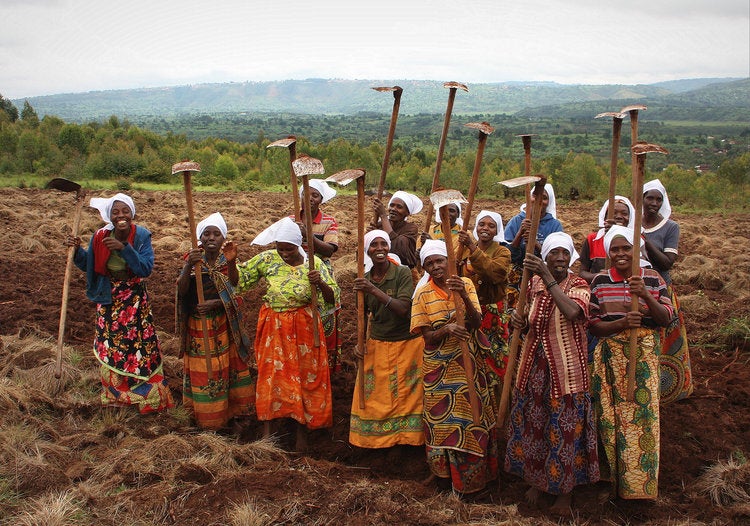From the Field, News
Tuesday, August 18, 2020
Shared Value: Building a Sustainable Future Together
Burundi’s specialty coffee industry is growing rapidly. Our sister company, Sucafina Burundi (Bugestal/Budeca), is working to make sure that this growth delivers shared value for all stakeholders. Two successful new projects in Burundi, run as part of our Farmer Hub initiative, are helping us to achieve this goal.

These projects help farmers and communities build more sustainable livelihoods and increase coffee quality and yield sizes. Our new general stores chain, Akacu, works to foster entrepreneurship and livelihoods in coffee-growing communities, and our work with female empowerment associations are helping female coffee farmers to obtain better control of their finances. Through these innovative measures, we are building the foundations for a durable and sustainable coffee supply chain.
Akacu Supports Entrepreneurship and Affordable Basic Goods
Our programs are always built in collaboration with the coffee communities with whom we work, and our new ‘general store’ model is an example of the benefits that such collaboration can bring. “Akacu” stores (named after the Kirundi word for ‘ours’) sell affordable basic goods and farm inputs and help communities create new job opportunities.
The Akacu concept was borne directly from some of the financial pressures our farmer-partners have experienced during the current price crisis. Throughout 2019 prices remained very low. To combat this, Sucafina and our sister companies in East Africa began to implement a suite of programs to support our quality-oriented farmer-partners. We paid the highest possible price for cherry, including regular quality bonuses, provided training in Good Agricultural Practices (GAP) to increase productivity, and worked with our sustainability partner, the Kahawatu Foundation, to help farmers manage their savings and finances.
Even with these programs, farmers still faced financial pressures due to the high costs of basic goods. When we asked our farmer-partners how we could help them to be more profitable, the answer was: lower the cost of basic goods and farming inputs.
The secret to helping farmers reduce costs, it turns out, is leveraging our scale to purchase basic goods and farm inputs in bulk and make them available at affordable prices. These goods can then be made available through small, locally-run general stores. After consultation, we decided that a franchise model, where local entrepreneurs manage and operate the stores themselves, would deliver the most benefit.
Every Akacu store is owned as a franchise by a local entrepreneur. Sucafina provides the brand, operational procedures, furniture and an IT system to help with store operations. However, the store itself is always operated by a member (or members) of the community. In this way, Sucafina bears the start-up costs of the local business, and local entrepreneurs can personalize their stores to better fit the needs of their community without undue risk. The stores also create employment opportunities for many other community members.
So far, Sucafina Burundi has helped open 22 Akacu stores within our own 9 washing stations and 13 partner washing stations. These stores have already reduced total household expenditures for over 75,000 people (about 10,000 farming families). We plan to open an additional 28 stores outside our direct network by the end of 2020 and to continue expanding to 200+ stores over multiple provinces by 2021.
Self-Empowerment Through Coffee
Another collaborative project that Farmer Hub is helping to deliver in Burundi centers on opportunities for women farmers. Rama Dufatanemunda is a women’s empowerment group that has advocated for land tenure for women since 2014. In Kirundi, Rama means ‘progress’, and Dufatanemunda means ‘ let's support each other’. Women in the Rama group have joined together to enact these concepts by using coffee production to increase women’s financial independence.
Sucafina Burundi and the Kahawatu Foundation started working with Rama in 2014 when we provided financing so they could buy the materials they needed to establish their own coffee fields on land they had advocated so hard to obtain. In 2015, we worked with them on a livestock project by providing goats. As the goats grow up and have kids, the goats’ owners then share the kids with other group members, expanding the chain of families who have access to goats.
In 2017, we were thrilled to buy cherry directly from Rama’s first coffee harvest at one of our washing stations, and we remain committed to buying their cherry to this day. At the washing station, we keep RAMA cherry separated to maintain traceability. Their exceptional lots frequently garner high prices, enabling us to distribute the profits directly back to the women.
Rama has also established 2 offshoot groups that are supporting other women coffee farmers. Sucafina Burundi and the Kahawatu Foundation are now providing financing for training and equipment for these groups, as well. We look forward to purchasing cherry from their first harvest in 2021.
Rama’s model of self-empowerment through coffee production has been so effective and powerful that we are now facilitating similar groups at all of our washing stations. Our goal is to sell full containers of women-produced coffee and to positively impact even more households.
We know that a sustainable supply chain is built through creative collaboration that brings value to actors across the supply chain. With Farmer Hub, we’re focusing on leveraging our scale to help farmers access inputs, reduce expenses and get more training to maximize their yields & quality. Farmer Hub and our new programs like Akacu and Rama Dufatanemunda are working with farmers to pave the way for ALL of our futures.